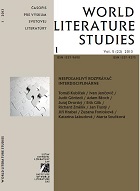Nespolehlivost – ale k čemu?
Unreliability — but for what?
Author(s): Tomáš KubíčekSubject(s): Literary Texts
Published by: SAV - Slovenská akadémia vied - Ústav svetovej literatúry
Keywords: Semiotics; Narratology; Clasical Narratology; Postclassical Narratology; Unreliability; Meaning
Summary/Abstract: The main aim of the text is to analyse the narratological category “unreliability” in relation to the basic domains within which it is defined by the postclasical narratology. The basis for the analysis are various texts − both the fictional and the nonfictional nature. In the scope of this study are fictional and nonfictional speakers and characters in relation to the three dimensions of textual worlds which are here understood as the strategy of construction of the meaning: the first is the domain or the construction of “truth”, the second is the domain or construction of “self ” and the third one is the domain or constructing of the whole of the fictional world − the domain of the text. I suggest in my study that while the first two domains are clamoring extratextual control activities, which is the relationship between text and context, only the third domain allows us to perceive unreliability as a narrative category as a category of narrative analysis.
Journal: World Literature Studies
- Issue Year: V/2013
- Issue No: 1
- Page Range: 3-16
- Page Count: 14
- Language: Czech

